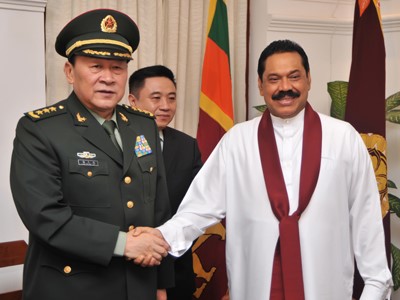 Addressing the Foreign Correspondents’ Club in New Delhi recently Amb. Prasad Kariawasam, Sri Lankan High Commissioner to India, stated that Sri Lanka’s relations with India and China are “not a zero sum game”. He considered India as Sri Lanka’s “relative and closest friend” and Colombo’s expanding relations with China are not in any way a “contradiction” to that. Amb. Kariawasam’s press meet took place soon after President Mahinda Rajapaksa’s successful visit to Beijing. China had agreed to provide a grant of $ 2.2 billion for infra-structure projects, in addition to existing arrangements for transfer of defence technology and training of Sri Lankan armed forces.
Addressing the Foreign Correspondents’ Club in New Delhi recently Amb. Prasad Kariawasam, Sri Lankan High Commissioner to India, stated that Sri Lanka’s relations with India and China are “not a zero sum game”. He considered India as Sri Lanka’s “relative and closest friend” and Colombo’s expanding relations with China are not in any way a “contradiction” to that. Amb. Kariawasam’s press meet took place soon after President Mahinda Rajapaksa’s successful visit to Beijing. China had agreed to provide a grant of $ 2.2 billion for infra-structure projects, in addition to existing arrangements for transfer of defence technology and training of Sri Lankan armed forces.
Amb. Kariawasam’s speech is an example of diplomatic finesse at its best. However, the triangular relations among China, Sri Lanka and India are not quite as rosy. Since the dawn of independence, Sinhalese leaders have been and continue to be obsessed with the colossus in the north. According to Sir John Kotelawala, a former Prime Minister, “the day Ceylon dispensed with Englishmen completely; the island would go under India”. He considered the defence arrangements with United Kingdom as the “first insurance” against any possibility of Indian aggression.
Two illustrations are given below to highlight how the India factor dominated Sri Lankan political thinking. One of the major foreign policy initiatives of Sri Lanka in the early 1970s was to get the Indian Ocean declared as a Zone of Peace (IOPZ). With the solid support of India and the non-aligned world, in October 1971, the UN General Assembly adopted the resolution. But when India imploded its nuclear device in May 1974, Sri Lanka changed its stance. Amb. Shirley Amarasinghe remarked, “We do not want any great power there. By the same token, we do not intend to drive out Satan by Beelzebub and allow some other powers within the group of littoral and hinterland states to take up the place of super powers”. To the dismay of New Delhi, Colombo also began to extend support to the Pakistani proposal to declare South Asia a Nuclear Weapon Free Zone.
Second, in May 1987 when New Delhi made it clear to President Jayewardene that it would not permit a military solution to the ethnic problem, Sri Lanka desperately tried to get Pakistan and China involved in its favour. Lalith Athulathmudali visited Islamabad and Beijing to solicit their support. Pakistan was in no position to assist Sri Lanka and China did not want to disturb the ongoing negotiations to normalize relations with India.
How does China fit into Sri Lankan foreign policy objectives and security considerations? The furtherance of national interests – ensuring security, promoting economic development, diversifying arms purchases, enhancing trade and investment – implies fruitful interaction with as many countries as possible. China, as a growing economic and military power, has to be befriended. From Colombo’s perspective what makes China an attractive choice is the fact that China is no longer interested in disturbing the status quo in international relations. Beijing stood solidly behind Sri Lanka during the Fourth Eelam War, not only by providing arms, but also by defending the government against criticisms mounted by human rights organizations, the European Union and the United States for committing gross human rights violations during the last days of the Fourth Eelam War.
India, on the other hand, cannot follow a foreign policy of opportunism and cynicism as China does. The Government in New Delhi has to reflect public opinion in the country. What is more, Colombo has gone back on solemn assurances that it would implement the 13th amendment sincerely and expeditiously.
Beijing and Colombo do not want New Delhi to exert a benign influence among neighbouring countries. According to Lin Liang Guang, a leading Chinese scholar on South Asian affairs, “the short sighted policy pursued by successive Indian Governments to make India the sole dominant power in South Asia has vitiated the strategic environment in South Asia”. Amb. Nanda Godage argues for enhanced ties between Colombo and Beijing to thwart the machinations of external powers. To quote Amb Godage from an article in The Island: “We were able to end the LTTE insurrection because China threw its weight behind us and sent us the required arms. Chinese aid to Sri Lanka is very many times more than the aid of countries like the US… Why I flag these facts is to make the point that we are not without real friends and we need not be at the mercy of any group of countries which seek to destabilize this country to please their domestic constituencies”.
Indian observers of Sri Lankan scene should ponder the implications of these statements.
Courtesy : Institute of Peace and Conflict Studies (http://www.ipcs.org)